-
ORIGINAL ARTICLE07-29-2024
Sexual counseling for people with acute coronary syndrome: educational video development
Revista Brasileira de Enfermagem. 2024;77(3):e20230416
Abstract
ORIGINAL ARTICLESexual counseling for people with acute coronary syndrome: educational video development
Revista Brasileira de Enfermagem. 2024;77(3):e20230416
DOI 10.1590/0034-7167-2023-0416
Views0See moreABSTRACT
Objective:
to assess validity evidence of an educational video on safe sexual activity after acute coronary syndrome.
Method:
study in three phases: video development; content validity analysis by 11 experts; and analysis of validity based on response processes by seven people with coronary disease. The content validity ratio (CVR) was calculated with critical values for the second phase of 0.63 and for the third of 1.0.
Results:
the video addressed the importance of resuming sexual activity and positions that consume less energy, clinical warning signs, the importance of adhering to treatment and a welcoming environment for sexual practice. A CVR above the critical value was obtained with a total of 4 minutes and 41 seconds.
Conclusion:
the educational video brings together adequate content validity evidence and can be used as a tool for patients after acute coronary syndrome.
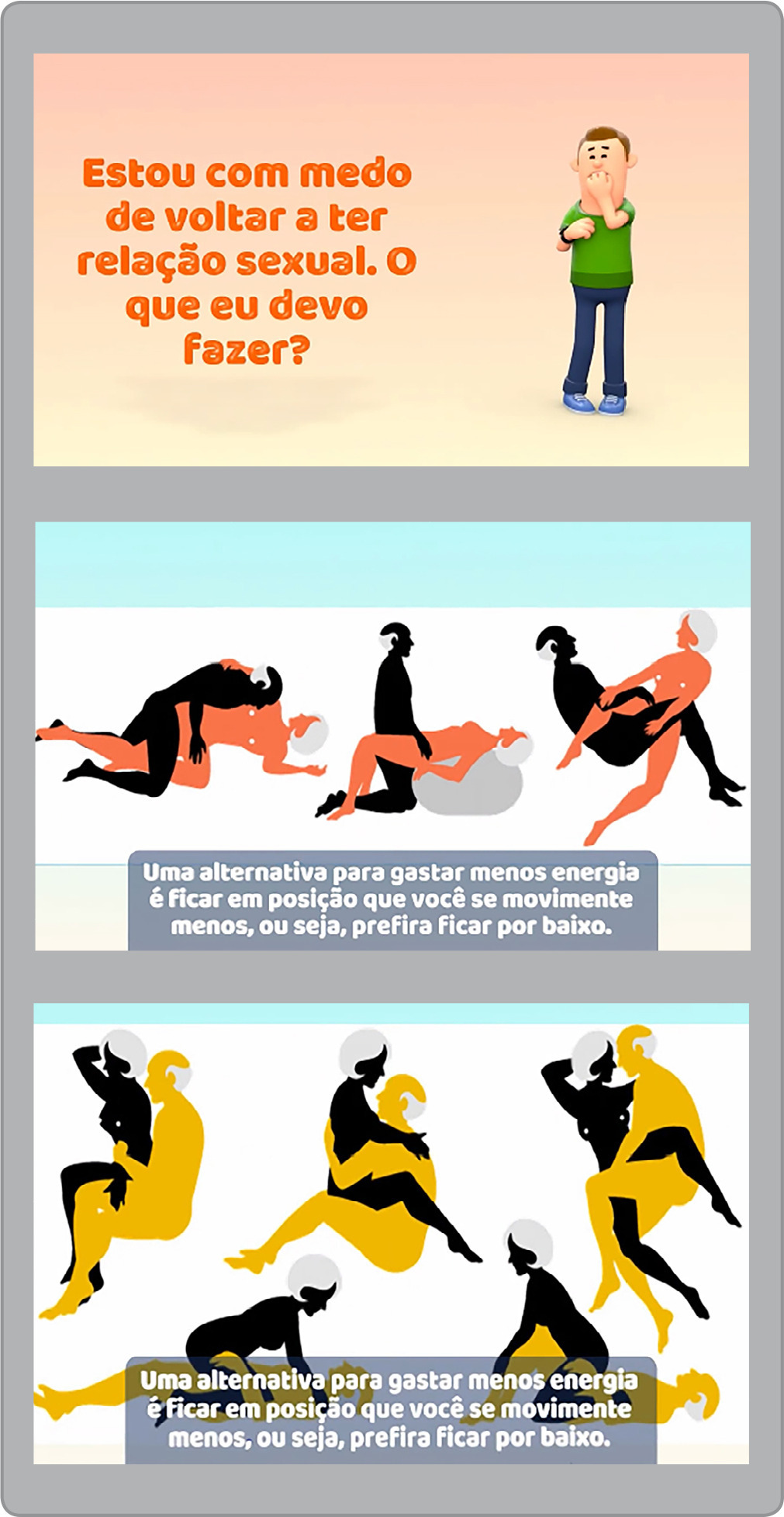
-
REVIEW07-29-2024
Utilization of local pressure devices in pain management during injections: scoping review
Revista Brasileira de Enfermagem. 2024;77(3):e20230399
Abstract
REVIEWUtilization of local pressure devices in pain management during injections: scoping review
Revista Brasileira de Enfermagem. 2024;77(3):e20230399
DOI 10.1590/0034-7167-2023-0399
Views0See moreABSTRACT
Objective:
to map scientific evidence regarding the use of local pressure devices in pain relief during injection procedures in patients.
Methods:
scoping review, following the recommendations of the JBI Manual for Evidence Synthesis and PRISMA-ScR, with searches conducted in the PubMed, EMBASE, CINAHL, LILACS, and PsycINFO databases, without temporal restrictions and with a cutoff date of March 2023.
Results:
a total of 1,514 studies were identified, with 20 articles included in the final sample. The ShotBlocker® device was utilized during subcutaneous and intramuscular injections in children and adults, proving beneficial in reducing pain, anxiety, and fear associated with the procedure.
Final considerations:
the ShotBlocker® is a low-cost, easy-to-use device that can enhance nursing clinical practice during painful procedures. However, studies involving the Brazilian Pikluc® device are scarce. Further research involving both local pressure devices is recommended.
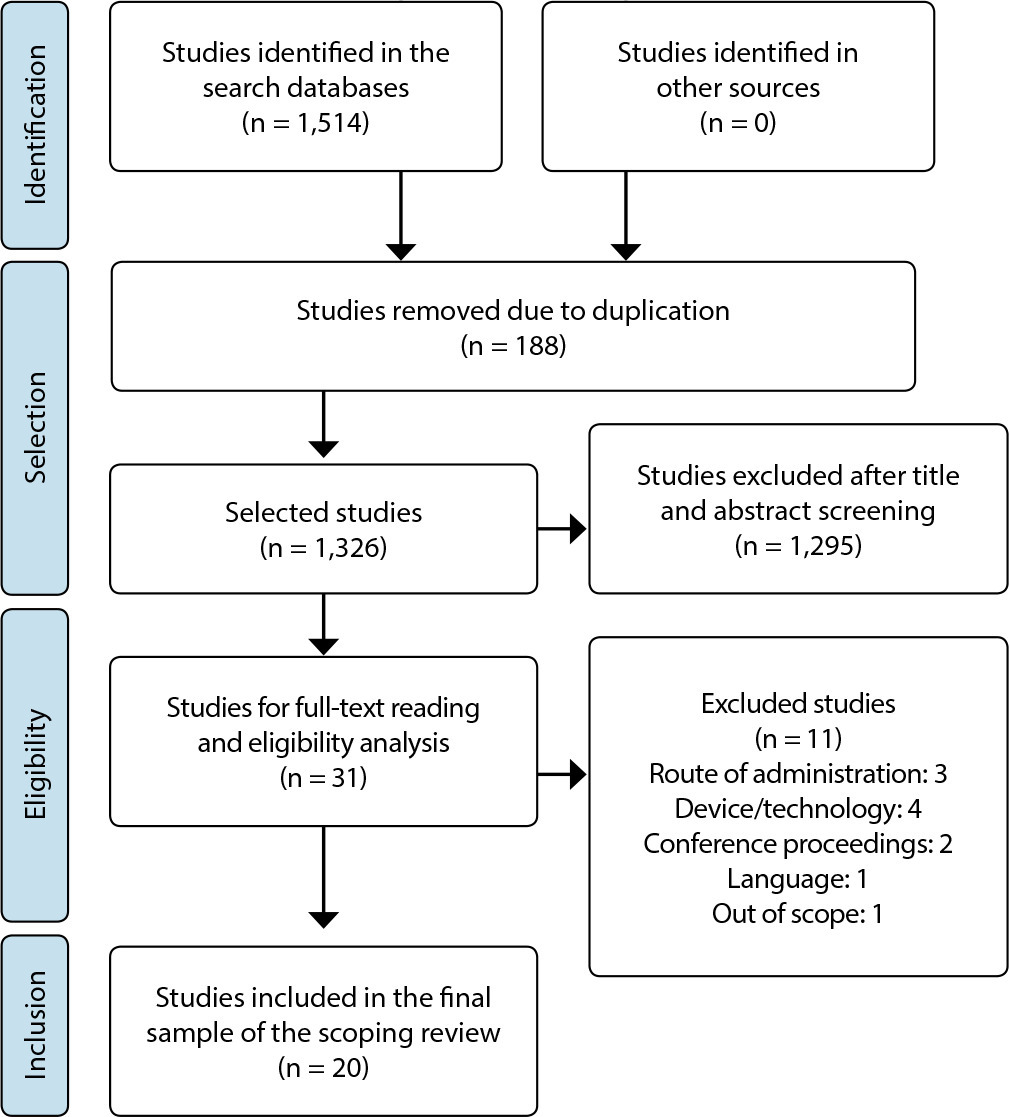
-
ORIGINAL ARTICLE07-29-2024
Evidence of validity of the Risk Self-Medication Questionnaire focused on Health Literacy
Revista Brasileira de Enfermagem. 2024;77(3):e20230386
Abstract
ORIGINAL ARTICLEEvidence of validity of the Risk Self-Medication Questionnaire focused on Health Literacy
Revista Brasileira de Enfermagem. 2024;77(3):e20230386
DOI 10.1590/0034-7167-2023-0386
Views0See moreABSTRACT
Objectives:
to analyze the validity evidence of the internal structure of the Risk Self-Medication Questionnaire Focused on Health Literacy.
Methods:
a psychometric study with 499 adults. The internal structure was assessed with exploratory and confirmatory factor analysis to prove the adjustment. Internal consistency was measured by composite reliability and McDonald’s omega coefficient (ω).
Results:
the parameters revealed a model of 35 items distributed across four factors, explaining 56% of the total variance, with factor loadings ranging from 0.31 to 0.85 and adequate communalities. Accuracy (0.79
Conclusions:
an instrument was obtained with good evidence of structural validity for measuring self-medication.
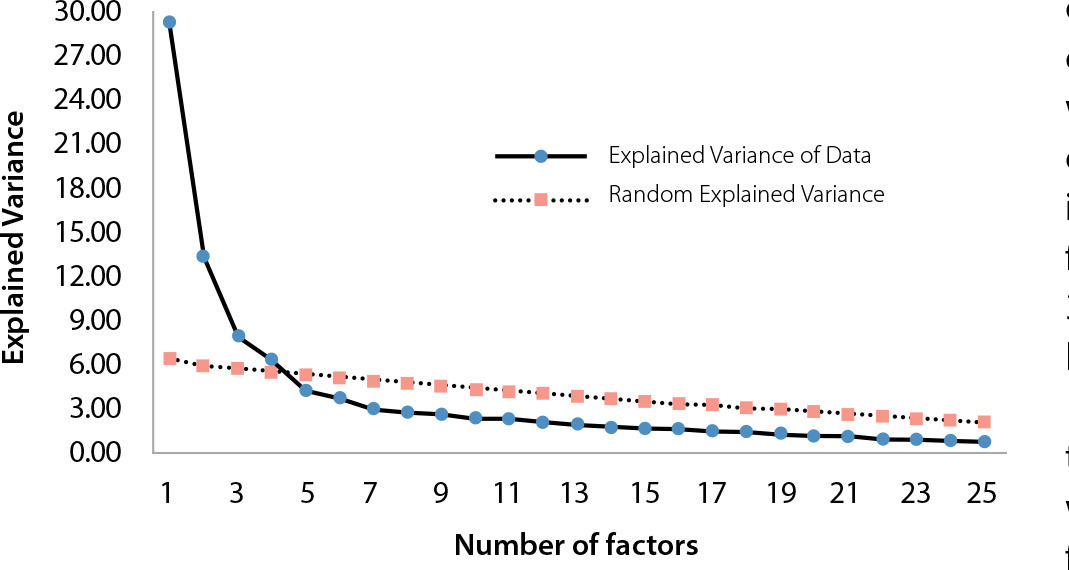
-
ORIGINAL ARTICLE07-29-2024
Nurses’ perspectives on nurses’ work methods
Revista Brasileira de Enfermagem. 2024;77(3):e20230374
Abstract
ORIGINAL ARTICLENurses’ perspectives on nurses’ work methods
Revista Brasileira de Enfermagem. 2024;77(3):e20230374
DOI 10.1590/0034-7167-2023-0374
Views0See moreABSTRACT
Objectives:
To analyze nurses’ perspectives on nurses’ work methods in the hospital context.
Methods:
A descriptive study with a qualitative approach was conducted in a hospital in northern Portugal, involving 17 nurses. Semi-structured interviews were used for data collection. Data collected between May and June 2023 underwent content analysis, supported by Atlas.ti software.
Results:
Three thematic areas emerged: “Nurses’ work methods in a hospital context,” highlighting the conception and components of work methods and the methods in use; “Implementation of nurses’ work methods,” emphasizing influencing factors and challenges to implementation; and “Impact of nurses’ work methods on patients, nurses, and institutions.”
Final Considerations:
Nurses’ work methods constitute the structure of nursing care. Some factors influence and some challenges arise in the implementation of these methods, producing impacts on patients, nurses, and institutions.

-
ORIGINAL ARTICLE07-29-2024
Evaluation of software technical quality for collecting data from patients under palliative care
Revista Brasileira de Enfermagem. 2024;77(3):e20230435
Abstract
ORIGINAL ARTICLEEvaluation of software technical quality for collecting data from patients under palliative care
Revista Brasileira de Enfermagem. 2024;77(3):e20230435
DOI 10.1590/0034-7167-2023-0435
Views0See moreABSTRACT
Objectives:
to evaluate software technical quality for collecting data from patients under palliative care.
Methods:
this is methodological technology evaluation research, according to the technical standard International Organization for Standardization/International Electrotechnical Commission 25040-2011, developed from August 2021 to August 2023. Eight nurses and eight information technology professionals participated as judges, who evaluated six quality characteristics and 23 subcharacteristics. Items that reached a percentage of agreement greater than 70% were considered suitable.
Results:
the characteristics evaluated by nurses/information technology professionals received the following percentages of agreement, respectively: functional suitability (94%-84%); reliability (100-70%); usability (89.9-66.8%); performance efficiency (95.8%-86.1%); compatibility (95.8-79.6%); and safety (96%-83.4%).
Conclusions:
the software was considered suitable in quality evaluation to offer support to nurses in collecting patient data under palliative care, with the potential to operationalize the first Nursing Process stage.
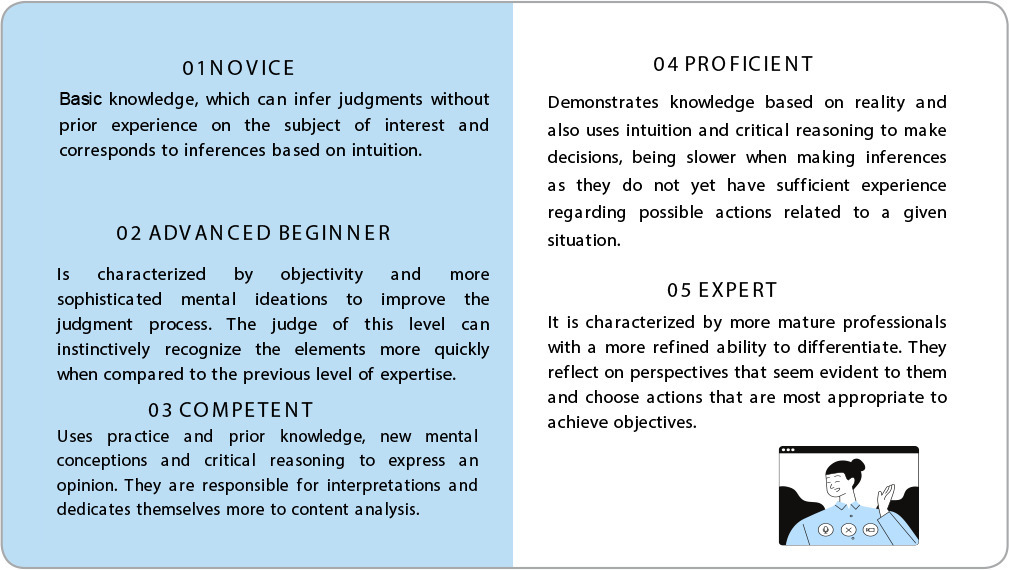
-
ORIGINAL ARTICLE07-29-2024
Excessive daytime sleepiness in nursing technicians: association with sleep quality and memory
Revista Brasileira de Enfermagem. 2024;77(3):e20230332
Abstract
ORIGINAL ARTICLEExcessive daytime sleepiness in nursing technicians: association with sleep quality and memory
Revista Brasileira de Enfermagem. 2024;77(3):e20230332
DOI 10.1590/0034-7167-2023-0332
Views0See moreABSTRACT
Objective:
to investigate excessive daytime sleepiness prevalence among nursing technicians and the association with sleep quality and memory.
Methods:
a cross-sectional, inferential study, carried out in a hospital unit in the state of Goiás between December 2020 and January 2021. Assessments were carried out using the Epworth Sleepiness Scale, the Pittsburgh Sleep Quality Index and the Prospective and Retrospective Memory Questionnaire, instruments validated for the Brazilian context. Bivariate and multivariate logistic regression analyzes were performed.
Results:
the sample consisted of 189 nursing technicians with a 40.9% excessive daytime sleepiness prevalence. In multivariate models, excessive daytime sleepiness was not associated with sleep quality, however there was a significant association with overall memory failures.
Conclusions:
study results demonstrate a high excessive daytime sleepiness occurrence, an association with overall memory failures and the need for psychosocial interventions for nursing technicians.
-
ORIGINAL ARTICLE07-29-2024
University Student Depression Inventory, Brazilian Version, Construct Assessment
Revista Brasileira de Enfermagem. 2024;77(3):e20230232
Abstract
ORIGINAL ARTICLEUniversity Student Depression Inventory, Brazilian Version, Construct Assessment
Revista Brasileira de Enfermagem. 2024;77(3):e20230232
DOI 10.1590/0034-7167-2023-0232
Views0See moreABSTRACT
Objectives:
to assess the University Student Depression Inventory, Brazilian version (USDI-BR), construct.
Methods:
a methodological study carried out with a snowball probabilistic sample, consisting of 334 undergraduate and graduate students. Confirmatory factor analysis, reliability using McDonald’s omega coefficient and Cronbach’s alpha were performed. Principal component analysis was performed using the varimax rotation and oblimin rotation, using the Kaiser-Meyer-Olkin criteria, Bartlett’s test of sphericity and scree plot.
Results:
the USDI-BR presented an internal consistency of items of ω = 0.95 and remained with 30 items, with the addition of 1 factor (Death wish and social withdrawal), totaling 4 factors.
Conclusions:
the USDI-BR has evidence that points to its validity and also its internal consistency, deserving that new studies be carried out to expand the evidence of its psychometric properties.
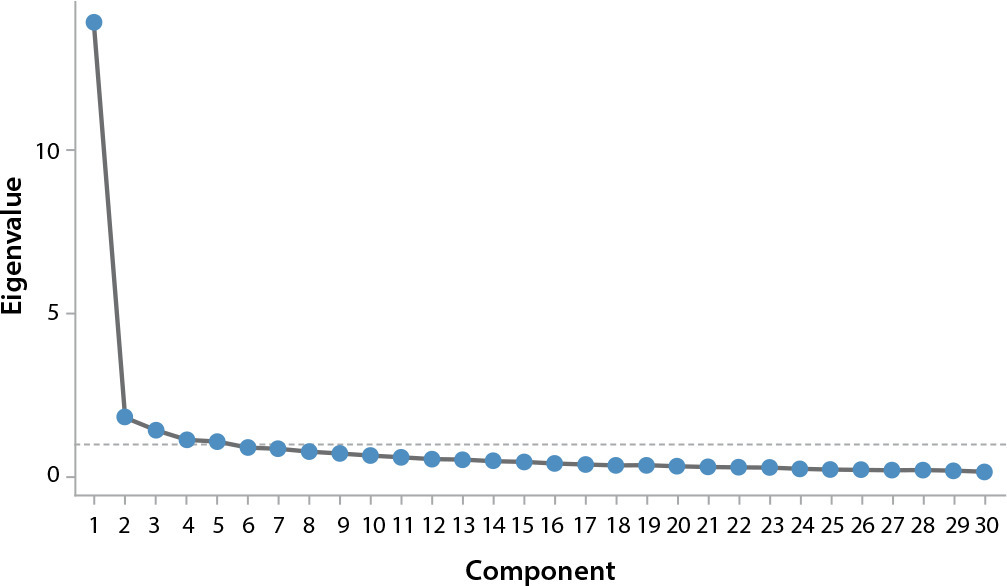
-
ORIGINAL ARTICLE07-29-2024
Fuzzy Logic: vulnerability of women who have sex with women to sexually transmitted infections
Revista Brasileira de Enfermagem. 2024;77(3):e20230271
Abstract
ORIGINAL ARTICLEFuzzy Logic: vulnerability of women who have sex with women to sexually transmitted infections
Revista Brasileira de Enfermagem. 2024;77(3):e20230271
DOI 10.1590/0034-7167-2023-0271
Views0See moreABSTRACT
Objective:
To describe the possibility of applying Fuzzy Logic in analyzing the vulnerability of Women Who Have Sex with Women to Sexually Transmitted Infections/HIV/AIDS.
Methods:
We developed a Fuzzy Logic system with 17 input variables and one output variable, using data related to vulnerability in a municipality located in the Midwest region of the State of São Paulo, Brazil.
Results:
The factor with the greatest positive impact was the confirmation that a low understanding of Sexually Transmitted Infections/HIV/AIDS is associated with higher vulnerability. Conversely, the statement “Not disclosing sexual activity to healthcare professionals,” where individuals do not admit to having sex with women, had the least impact.
Conclusions:
Fuzzy Logic facilitates the identification of vulnerability, expressed through the analysis of interaction between variables in each dimension. This makes it a promising method to assist in analyzing the vulnerability of specific populations.
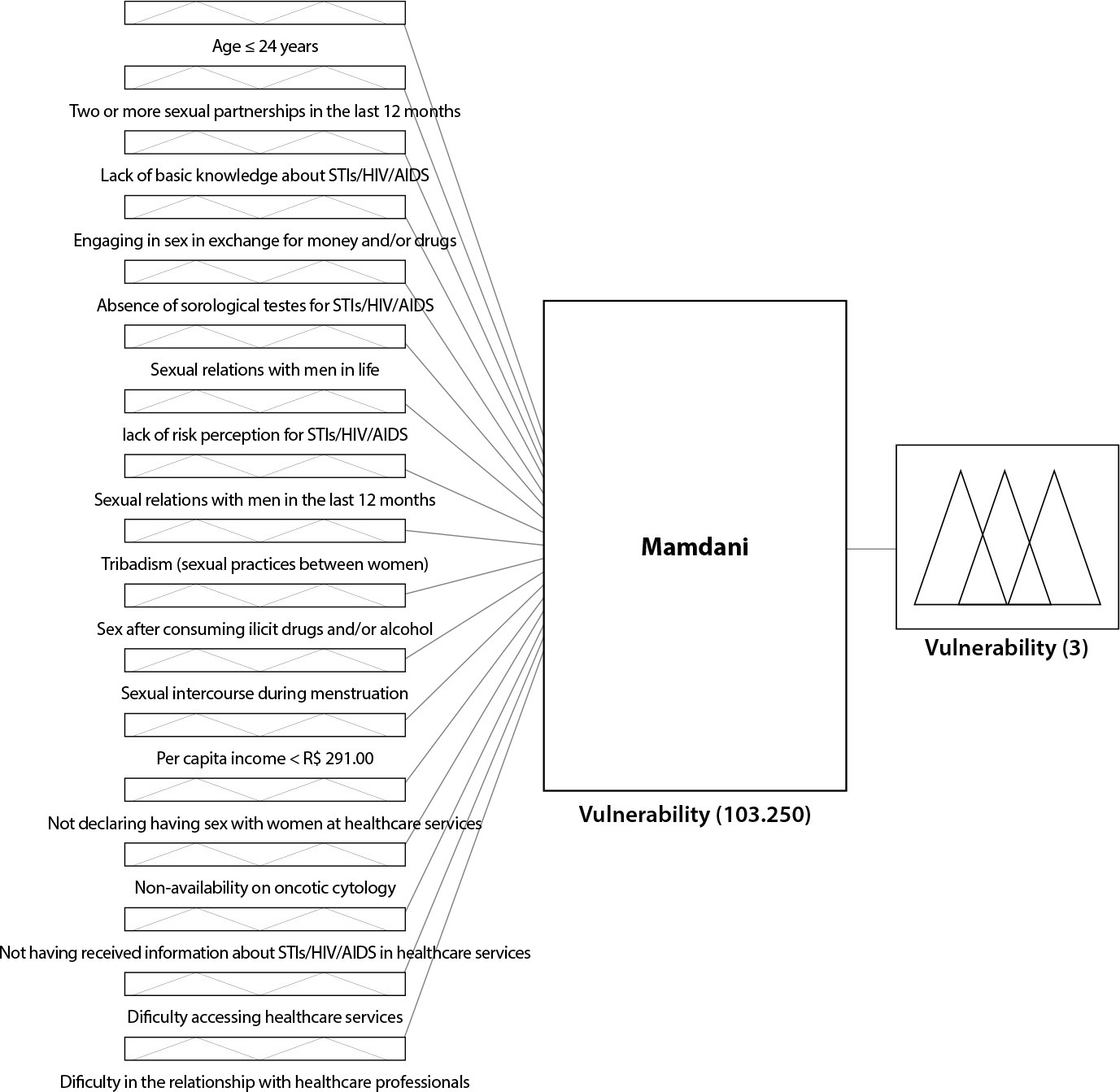
-
ORIGINAL ARTICLE07-13-2020
Mental health of nursing in coping with COVID-19 at a regional university hospital
Revista Brasileira de Enfermagem. 2020;73:e20200434
Abstract
ORIGINAL ARTICLEMental health of nursing in coping with COVID-19 at a regional university hospital
Revista Brasileira de Enfermagem. 2020;73:e20200434
DOI 10.1590/0034-7167-2020-0434
Views0See moreABSTRACT
Objective:
to identify prevalence and factors associated with anxiety and depression in nursing professionals who work to cope with COVID-19 at a university hospital.
Methods:
a cross-sectional observational study using a sociodemographic questionnaire and Hospital Anxiety and Depression Scale, with 88 nursing professionals. Data were analyzed using absolute and relative frequency and Statistical Package for the Social Sciences.
Results:
there was prevalence of anxiety (48.9%) and depression (25%). The majority of the sample consisted of women over 40 years old, married or in a common-law marriage, white, with higher education or graduate degree, with an income above 3,000.00 reais, public servants, working 40 hours a week and working in the hospital from 1 to 5 years.
Conclusion:
we must consider the impact on mental health nursing caused by COVID-19 and intervene with coping strategies to minimize the suffering of professionals.
-
REFLECTION04-22-2020
Thematic content analysis using ATLAS.ti software: Potentialities for researchs in health
Revista Brasileira de Enfermagem. 2020;73(3):e20190250
Abstract
REFLECTIONThematic content analysis using ATLAS.ti software: Potentialities for researchs in health
Revista Brasileira de Enfermagem. 2020;73(3):e20190250
DOI 10.1590/0034-7167-2019-0250
Views0See moreABSTRACT
Objective:
to describe the most important tools of ATLAS.ti Software and to associate them with the procedures of Thematic Content Analysis.
Method:
It is a theoretical reflection of the Content Analysis phases of Laurence Bardin, associating them with software tools Atlas.ti and showing its usefulness for data analysis in qualitative research.
Results:
historical contextualization and the available resources of Atlas.ti software with presentation of health research involving the phases of thematic content analysis.
Final considerations:
The Atlas.ti software assists in the accomplishment of the thematic content analysis being this promising association in health research.

-
REFLECTION10-26-2020
Nursing education: challenges and perspectives in times of the COVID-19 pandemic
Revista Brasileira de Enfermagem. 2020;73:e20200683
Abstract
REFLECTIONNursing education: challenges and perspectives in times of the COVID-19 pandemic
Revista Brasileira de Enfermagem. 2020;73:e20200683
DOI 10.1590/0034-7167-2020-0683
Views0See moreABSTRACT
Objective:
To discuss the challenges and perspectives of nursing education in times of the COVID-19 pandemic.
Methods:
Reflection study, with theoretical approach based on national and international publications, allied to the experience of researchers in the area of nursing education.
Results:
Four sections are identified: Nursing education: current affairs and perspectives; Education and technologies in time of pandemic: acceleration, alteration and paralysis; Difference between emergency, intentional and remote teaching; the return to the “new normality”: new structuring axes and legal norms.
Final considerations:
The conclusion is that longstanding challenges have emerged with the pandemic, and the processes of acceleration, change and paralysis have marked education in these times. Moreover, epidemiological, technological and psychological aspects should be more valued in the return to activities.
-
ORIGINAL ARTICLE11-13-2020
Social determinants of health and COVID-19 infection in Brazil: an analysis of the pandemic
Revista Brasileira de Enfermagem. 2020;73:e20200673
Abstract
ORIGINAL ARTICLESocial determinants of health and COVID-19 infection in Brazil: an analysis of the pandemic
Revista Brasileira de Enfermagem. 2020;73:e20200673
DOI 10.1590/0034-7167-2020-0673
Views0See moreABSTRACT
Objective:
To analyze the influence of socioeconomic, demographic, epidemiological factors, and the health system structure in the evolution of the COVID-19 pandemic in Brazil.
Methods:
Ecological study with variables extracted from databases, having the incidence and mortality by COVID-19 until August 23, 2020, in Brazilian states, as response variables. The magnitude of the associations was estimated using Spearman’s correlation coefficient and multiple regression analysis.
Results:
In the Brazilian states, 59.8% of variation in the incidence of COVID-19 was justified by income inequality, significant home densification, and higher mortality. In the case of mortality, those same variables explained 57.9% of the country’s variations in federal units.
Conclusion:
Our results indicate that socioeconomic factors influenced the evolution and impact of COVID-19 in Brazil. Thus, we suggest comprehensive actions to ensure economic conditions and strengthening of health networks for populations with socioeconomic vulnerability.
-
ORIGINAL ARTICLE06-27-2019
Validation of a booklet on self-care with the diabetic foot
Revista Brasileira de Enfermagem. 2019;72(3):780-787
Abstract
ORIGINAL ARTICLEValidation of a booklet on self-care with the diabetic foot
Revista Brasileira de Enfermagem. 2019;72(3):780-787
DOI 10.1590/0034-7167-2017-0900
Views0See moreABSTRACT
Objective:
to describe the validation of the booklet on self-care with the feet of people with diabetes.
Method:
methodological study, focusing on the validation of a printed booklet. The content and appearance of the booklet was validated by 23 judges divided into three groups: 11 content and appearance, seven technicians and five of the area of design and marketing. The appearance was validated by 30 people with type 2 Diabetes Mellitus.
Results:
the judges in the nursing area allowed the validation of material with a Content Validity Index (CVI) of 0.99, judges in the area of design and marketing with Suitability Assessment of Materials (SAM) of 99.2% and the target audience with concordance index of 99.4%.
Conclusion:
the educational booklet proved to be valid and reliable educational material to be used in order to promote compliance with self-care with the feet of people with Diabetes Mellitus.

-
ORIGINAL ARTICLE08-10-2020
Braden Scale in pressure ulcer risk assessment
Revista Brasileira de Enfermagem. 2020;73(6):e20190413
Abstract
ORIGINAL ARTICLEBraden Scale in pressure ulcer risk assessment
Revista Brasileira de Enfermagem. 2020;73(6):e20190413
DOI 10.1590/0034-7167-2019-0413
Views0See moreABSTRACT
Objective:
To analyze the applicability of the Braden Scale to individuals admitted to an Intensive Care Unit (ICU) with the nursing diagnosis Impaired Physical Mobility, in its prediction potential to develop pressure ulcer (PU).
Methods:
A cross-sectional, quantitative study that evaluated all patients hospitalized in an ICU between November 2016 and February 2017, with the Braden Scale.
Results:
The prevalence of PU was 35.8% (24/67), in male individuals 58.3% (14/24), diagnosed with ischemic CVA 51.9% (12/27), and with hemorrhagic CVA 7.4% (2/27). Among patients classified at severe risk of developing pressure ulcer, 83.3% (20/53) developed it, and 76.7% (33/53) did not develop it.
Conclusion:
The performance of the Braden Scale showed a balance between sensitivity and specificity, confirming it as a better predictive risk assessment instrument in this group of patients.
-
ORIGINAL ARTICLE02-27-2020
Prevalence of symptoms and quality of life of cancer patients
Revista Brasileira de Enfermagem. 2020;73(2):e20180287
Abstract
ORIGINAL ARTICLEPrevalence of symptoms and quality of life of cancer patients
Revista Brasileira de Enfermagem. 2020;73(2):e20180287
DOI 10.1590/0034-7167-2018-0287
Views0See moreABSTRACT
Objectives:
to analyze the prevalence of symptoms and their relationship with the quality of life of cancer patients.
Methods:
this is a cross-sectional study with 107 patients evaluated using a sociodemographic instrument, the hospital anxiety and depression scale (HADS) and the quality of life scale (EORTC-QLQ-C30). Pearson’s correlation test was used to evaluate the relationship between symptoms and quality of life.
Results:
prevalence of female patients (56.1%), 55 years as the mean age and 10 years of schooling. Fatigue (76.6%), insomnia (47.7%), pain (42.1%), loss of appetite (37.4%), anxiety (31.8%) and depression (21.5%) were identified. Anxiety and depression symptoms presented a negative correlation with quality of life and positive correlation with physical symptoms.
Conclusions:
fatigue, insomnia, pain and loss of appetite were the most common and most intense symptoms. Anxiety and depression symptoms presented a negative correlation with quality of life and positive correlation with physical symptoms.
-
REVIEW03-24-2021
Strategies of active learning methodologies in nursing education: an integrative literature review
Revista Brasileira de Enfermagem. 2021;74(1):e20200130
Abstract
REVIEWStrategies of active learning methodologies in nursing education: an integrative literature review
Revista Brasileira de Enfermagem. 2021;74(1):e20200130
DOI 10.1590/0034-7167-2020-0130
Views0See moreABSTRACT
Objectives:
to analyze the scientific evidence on the strategies of active learning methodologies used in the training of nurses, as well as their contributions and obstacles in training.
Methods:
integrative literature review conducted with 33 selected articles in the Medical Literature Analysis and Retrieval System Online, Latin American and Caribbean Literature in Health Sciences, Nursing Database, Scopus, Web of Science and Education Resources Information Center databases.
Results:
among the strategies, simulation, problem-based learning and flipped classroom were highlighted. The active search, the integration of theory and practice and group work were examples of contributions to the training of nurses. However, the lack of preparation of the actors and the lack of structural support contribute to the dissatisfaction of the students.
Final Considerations:
the active learning methodology places the student at the heart of the learning process, favors critical thinking and the ability to make decisions.
Search
Search in:
Nuvem de Tags
Adolescente (85) Atenção Primária à Saúde (239) COVID-19 (91) Criança (91) Cuidados de Enfermagem (269) Educação em Enfermagem (151) Educação em Saúde (139) Enfermagem (930) Enfermagem Pediátrica (86) Estudantes de Enfermagem (77) Estudos de Validação (131) Família (87) Idoso (208) Promoção da Saúde (99) Qualidade de Vida (104) Saúde do Trabalhador (86) Saúde Mental (145) Saúde Pública (82) Segurança do Paciente (150) Tecnologia Educacional (100)



